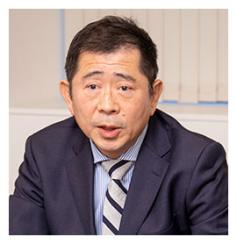Yoshikazu Ishii is the CIO & Managing Director for the pension fund at Chiba Bank, one of Japan’s largest local banks, a role he’s held since 2017. Prior to heading up Chiba Bank’s defined benefit fund, he worked in international finance at a leasing company, and in asset management and investment banking. The fund’s assets stood at about JPY 60 billion in 2019. In this interview, Ishii talks about the approach he brought with him to Chiba Bank’s pension fund, and his belief in principled management.

“My first major task was to re-evaluate our financial condition. Prior to my arrival, our portfolio maintained a rather traditional profile consisting of mostly Japanese equities. One manager oversaw the entire portfolio, rather than individual managers handling particular asset types. When I arrived, however, the market environment had changed drastically and the inverse correlation among assets no longer applied – I knew we had to rethink our portfolio from the ground up.”
“Investment requires an ethos, so I developed an ethos and guidelines that would govern our portfolio and investment policy. I was determined we would stick to it, so I established our internal “Rules for Investment Management” and “Philosophy of Investment Management.” My intention was to maintain our investment principles regardless of distractions arising from market trends or changes in personnel.”
Learn more about Japan’s funds market.
“Based on my experience, I formulated the following 10 “Rules for Investment Management”:
- Approach the markets and investing with caution. Don’t be arrogant.
- Fundamentals are always more important than temporary trends. Don’t invest in what you don’t understand.
- Think for yourself. Don’t be a “yes man.”
- Look beyond the superficial, and always ask why, why, and why.
- To catch the changing tide, keep a broader view. Don’t get hung up on daily price moves in the market.
- Don’t get caught by a change in the market.
- Remember market axioms – they’re not just catchy, they’re true.
- Don’t let personal views guide investment decisions.
- The goal isn’t to accumulate knowledge, but to gather and apply wisdom.
- Analyze from a comprehensive, long-term point of view.”
- Seek diversity, avoid chasing fads and flimsy returns, and stick to our principles.
- Clearly identify the source of potential profit.
- Don’t invest where liquidity is low and the risk of losing underlying assets is high.
- Evaluate both quantity and quality, but emphasize qualitative analysis.”
“When I see a portfolio, I understand an asset manager’s way of thinking and intent. If not, it’s possible that there was no guiding policy or the manager lost his way by frequently replacing funds.”
“Our pension fund adopted Japan’s Stewardship Code1 in September 2019. I’ve thought for some time now that if an asset manager invests in improving corporate value, pension participants will benefit. Therefore, pension funds must fulfill their responsibility by participating in the investment chain as asset owners and essential stakeholders. Unfortunately, most corporate pension funds haven’t adopted the code. I believe most funds either misunderstand the code or don’t know enough about it and overestimate the monitoring involved.”
“Ultimately, seven pension funds, including ours, adopted the Stewardship Code and acknowledged that we have to work on stewardship activity to fulfill our responsibility as asset owners. We have to take a first step without exaggerating the burden of monitoring stewardship activity. To start, we need only to meet the minimum requirement. After that, we can figure it out as we go.”
“When each fund acts alone, it is difficult to make progress. But when we share opinions with peers and discuss our concerns thoroughly, we can solve problems. I hope our actions can help other pension funds and serve as an example for fulfilling the responsibilities of the code.”
Learn more about Japan’s funds markets.
“Our fund requires all management companies, including foreign stock and bond managers, to report their stewardship activities. If we are in a fiduciary relationship with them, I want to know how they perform their stewardship duties. We also want to assess each manager’s attitude and positivity toward stewardship activities. Under the code, managers are required to explain how performance is linked to their stewardship activity. This can only enrich our discussions at management report meetings, which were previously more of a formality.”
“In the half-year since we adopted the code, we have suggested some changes to manager’s reports of their stewardship activities:
- When reporting “engagement dialogues,” don’t include meetings where the number of participants prohibited a meaningful exchange of ideas, i.e. meetings about account settlements, investor relations, etc.
- Classify and disclose engagement dialogues by number of companies, engagements, and ratios of the classification.
- Dialogues with investees should include not only payout ratios and stock buybacks, but also business models and corporate governance.
- Make suggestions when you identify areas in need of improvement. Follow up to see how (or if) suggestions are implemented. Disclose cases in which your suggestions result in improvements.
- Be transparent and specific about the reasoning and results of voting, regardless of whether you agree.”
1 The Code, first released by the FSA in 2014, sets out the principles for institutional investors to fulfill their responsibilities for sustainable growth of investee companies and enhancing the medium- to long-term investment return, for their clients and beneficiaries, through constructive engagement or purposeful dialogue. The Code was revised in 2017 and in 2020. Although the Code is not legal binding, it adopts a “comply or explain” approach under which an institutional investor can either disclose its intention to comply with a principle or provide sufficient explanation as to why it is not suitable to adopt the principle. The number of signatories to the Code has been increasing, and as of May 2020, two hundred eighty-one institutional investors have signed on, only fifty-three of which are pension funds.






